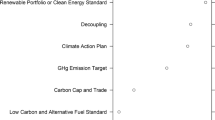Abstract
This article examines the potential of trade measures to induce more climate-friendly policies, focusing on the relationship between global trade rules and the Kyoto climate regime. At the core of this interplay is the normative consistency of trade-related rules in the two regimes and any hierarchical relationship between them. The stronger clout of the WTO and its compulsory dispute settlement system suggest that issues involving competing claims would be referred to WTO bodies. Such bodies have so far been restrictive regarding the exceptions in WTO agreements to the general ban on embargoes and discrimination. The normative compatibility of the two regimes will also depend on their participatory interplay, specifically how they differentiate groups of actors as to rights and obligations. Non-members of WTO receive the least protection, and their vulnerability to climate-related trade measures is largely determined by their interdependence with states that consider employment of such measures. Among WTO members, the findings of a dispute settlement body would presumably differ depending on the status of the target under the Kyoto Protocol. A non-complier with Kyoto commitments would be more shielded than a non-party, because by joining the Kyoto regime a non-complier has exposed itself to regime-internal and less trade intrusive measures that should be exhausted first. A third dimension of interplay is linkage, or efforts to influence the regime interplay. To date there has only been moderate cross-agency coordination, but considerable attention is paid within each regime, including in the Millennium Round of trade negotiations, to the desirability of avoiding conflict between them.
Similar content being viewed by others
References
D.A. Baldwin (1999) ArticleTitle‘The Sanctions Debate and the Logic of Choice’ International Security 24 80–107
J. Bhagwati (2002) ArticleTitle‘Afterword: The Question of Linkage’ American Journal of International Law 96 126–134
D. Brack M. Grubb C. Windram (2000) International Trade and Climate Change Policies Royal Institute of International Affairs, and Earthscan London
B.W. Chambers (2001) ‘International Trade Law and The Kyoto Protocol’ W.B. Chambers (Eds) Inter-linkages: The Kyoto Protocol and the International Trade and Investment Regimes United Nations University Press Tokyo 87–118
S. Charnovitz (1994) ArticleTitle‘Free Trade, Fair Trade: Green Trade: Defogging the Debate’ Cornell International Law Journal 27 459–525
S. Charnovitz (2002a) ArticleTitle‘The WTO’s Problematic “Last Resort” Against Non-Compliance’ Aussenwirtschaft 57 409–439
S. Charnovitz (2002b) ArticleTitle‘The Law of Environmental “PPMs” in the WTO: Debunking the Myth of Illegality’ Yale Journal of International Law 27 57–110
Charnovitz, S. (2003), ‘Trade and Climate: Potential Conflicts and Synergies’, in Beyond Kyoto: Advancing the International Effort Against Climate Change. Arlington, VA: Pew Center on Global Climate Change (www.pewclimate.org).
EU Commission, DG Trade (2001), ‘Trade and the Environment: Support Sustainable Development’ (www.europa.eu.int/comm/trade/index_en.htm).
S.T. Fox (1996) ArticleTitle‘Responding to Climate Change: The Case for Unilateral Trade Measures to Protect the Global Atmosphere’ Georgetown Law Journal 84 IssueID2 499–542
R. Friedheim (Eds) (2001) Towards a Sustainable Whaling Regime University of Washington Press Seattle
Jacob, T. (2001), ‘U.S Industry and Climate Change’, DuPont, Senior Advisor, Global Affairs. Memo, limited circulation by Tom.Jacob@U.S.A.dupont.com.
L. Jenkins (1996) ‘Trade Sanctions: Effective Enforcement Tools’ J. Cameron J. Werksman P. Roderick (Eds) Improving Compliance with International Environmental Law Earthscan London 221–228
C.C. Joyner Z. Tyler (2000) ArticleTitle‘Marine Conservation versus International Free Trade: Reconciling Dolphins with Tuna and Sea Turtles with Shrimp’ Ocean Development and International Law 31 127–150
C. Kemfert R.S.J. Tol (2002) ArticleTitle‘Equity, International Trade and Climate Policy’ International Environmental Agreements 2 23–48
K. Knorr (1977) International Economic Leverage and its Uses K. Knorr F.N. Trager (Eds) Economic Issues and National Security Regents Press of Kansas Lawrence, KA 99–126
Mitchell, R.(forthcoming), ‘Flexibility, Compliance and Norm Development in the Climate Regime’, in O. S. Stokke, J. Hovi and G. Ulfstein, eds., Implementing the Climate Regime: International Compliance. London: Earthscan.
E. Neumayer (2001) Greening Trade and Investment: Environmental Protection Without Protectionism Earthscan London
S. Oberthür (2001) ArticleTitle‘Linkages between the Montral and Kyoto Protocols: Enhancing Synergies between Protecting the Ozone Layer and the Global Climate’ International Environmental Agreements 1 357–377
S. Oberthür (2002) ArticleTitle‘Clustering of Multilateral Environmental Agreements: Potentials and Limitations’ International Environmental Agreements 2 317–340
Oberthür, S. and T. Gehring (2001), Conceptualizing Interaction between International and EU Environmental Institutions. Berlin: Ecologic (www.ecologic.de/interaction/890_deliverables.html)
S. Oberthür H.E. Ott (1999) The Kyoto Protocol: International Climate Policy for the 21st Century Springer Berlin
R.A. Pape (1977) ArticleTitle‘Why Economic Sanctions Do Not Work’ International Security 22 90–136
G.K. Rosendal (2001) ArticleTitle‘Overlapping International Regimes: The Case of the Intergovernmental Forum on Forests (IFF) between Climate Change and Biodiversity’ International Environmental Agreements 1 447–468
G. Sampson (2001) ‘WTO Rules and Climate Change: The Need for Policy Coherence’ W.B. Chambers (Eds) Inter-linkages: The Kyoto Protocol and the International Trade and Investment Regimes United Nations University Press Tokyo 69–85
T.J. Schoenbaum (1997) ArticleTitle‘International Trade and Protection of the Environment: The Continuing Search for Reconciliation’ American Journal of International Law 91 268–313
O.S. Stokke (2000) ArticleTitle‘Managing Straddling Stocks: The Interplay of Global and Regional Regimes’ Journal of Ocean and Coastal Management 43 205–234
Stokke, O. S. (2001), The Interplay of International Regimes:Putting Effectiveness Theory to Work, FNI Report 10/2001. Lysaker: The Fridtjof Nansen Institute (www.fni.no/publ/theory.html#Interplay).
Stokke, O. S., J. Hovi and G. Ulfstein (eds. forthcoming), International Compliance: Implementing the Climate Regime. London: Earthscan.
J. Werksman (1999) ArticleTitle‘Greenhouse Gas Emissions Trading and the WTO’ Review of European Community and International Environmental Law 8 1–14
J. Werksman K.A. Baumert N.K. Dubash (2003) ArticleTitle‘Will International Investment Rules Obstruct Climate Protection Policies: An Examination of the Clean Development Mechanism’ International Environmental Agreements 2 59–86
K. Wolfke (1993) Custom in Present International Law (second revised edition; first edition in Series of the Wroclaw Scientific Society, 1964) Martinus Nijhoff Dordrecht
O.R. Young (2002) The Institutional Dimensions of Environmental Change: Fit, Interplay, and Scale MIT Press Cambridge, MA
Author information
Authors and Affiliations
Corresponding author
Rights and permissions
About this article
Cite this article
Schram stokke, O. Trade Measures and Climate Compliance: Institutional Interplay Between WTO and the Marrakesh Accords. Int Environ Agreements 4, 339–357 (2004). https://doi.org/10.1007/s10784-004-2471-6
Accepted:
Issue Date:
DOI: https://doi.org/10.1007/s10784-004-2471-6



